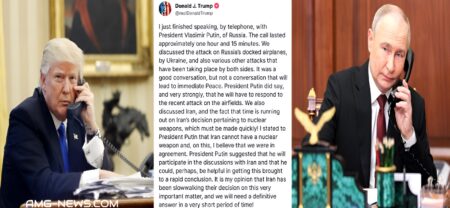Breaking News: Iran’s President Ebrahim Raisi “Dies” in Helicopter Crash – BRICS Alliance Shaken, Vladimir Putin’s Urgent Visit to Iran
Ready to uncover the truth? Sick of the lies? Join our Telegram Channel now. It’s time for the real story! Stay informed! My gratitude to all my readers!
Breaking News: Iran’s President Ebrahim Raisi tragically “died” in a helicopter crash. Explore the implications for the BRICS alliance, Vladimir Putin’s visit to Iran, and the unfolding geopolitical landscape.
Iran’s President Ebrahim Raisi tragically “died” in a helicopter crash on May 19th, 2024, alongside Foreign Minister Amir-Abdollahian. This incident has sent ripples through the geopolitical landscape, raising questions about the true nature of global power dynamics and the forces at play.
Raisi, a formidable leader, was a prominent figure advocating against the New World Order, aligning himself with the BRICS nations and pushing for a multipolar world. His untimely death has left a vacuum in the anti-hegemony movement and sparked a series of alarming events worldwide.
Raisi’s Vision: Uniting Against the New World Order. President Ebrahim Raisi was not just any leader; he was a visionary striving to dismantle the existing global power structures dominated by Western influence. His bold moves included joining the BRICS (Brazil, Russia, India, China, South Africa) alliance, strengthening ties with Russia, and advocating for the de-dollarization of the global economy. Raisi’s stance against Zionism and his unwavering support for Palestine further cemented his position as a staunch opponent of Western hegemony.
Raisi’s strategy, dubbed “Look East,” aimed to forge strong alliances with Africa and Latin America, regions historically marginalized by the West. This approach mirrored the ambitions of another controversial leader, Muammar Gaddafi, who sought to create an African Union with its own gold-backed currency before being ousted and killed in a NATO-led intervention.
The Shadow of Gaddafi Parallel. The similarities between Raisi and Gaddafi are striking. Both leaders envisioned a world free from Western dominance, advocating for economic independence and stronger regional alliances. Gaddafi’s dream of a united Africa with a sovereign currency threatened the established financial systems, leading to his downfall through a brutal NATO intervention.
BRICS, under Raisi’s influence, was working towards a similar goal: creating a new financial system that could challenge the dollar’s supremacy. This vision posed a direct threat to the New World Order, making Raisi a target for those who benefit from the status quo.
Putin’s Tribute. In a move laden with symbolism, Russian President Vladimir Putin is set to travel to Iran for Raisi’s funeral on Thursday. Putin’s jet will be escorted by four Russian Sukhoi 35 fighter jets, a powerful display of respect and solidarity. This unprecedented gesture underscores the deep alliance between Russia and Iran and serves as a stark reminder of the shifting power dynamics in the world.
A Series of Unfortunate Events: Coincidence?
The past two weeks have been tumultuous, with a string of high-profile incidents that seem more than coincidental:
-
May 7th: An assassination attempt against Saudi Crown Prince Mohammed bin Salman.
-
May 13th: Turkish President Recep Tayyip Erdoğan held an emergency meeting following warnings of a possible military coup.
-
May 15th: An assassination attempt on Slovak Prime Minister Robert Fico.
-
May 16th: A citizen was arrested for threatening to assassinate Serbian President Aleksandar Vučić.
-
May 19th: Saudi Arabia’s King Salman was hospitalized for the second time in four weeks.
-
May 19th: The helicopter crash that claimed the lives of President Raisi and Foreign Minister Amir-Abdollahian.
These events suggest a concerted effort to destabilize leaders who challenge the prevailing global order. The timing and nature of these incidents hint at a larger, more insidious plot aimed at maintaining the dominance of the New World Order.
What Lies Ahead: The Global Implications. Raisi’s death leaves a significant void in the anti-hegemony movement. His leadership was pivotal in rallying nations against the New World Order, and his loss could weaken the resolve of those who followed his vision. However, it also presents an opportunity for new leaders to rise and continue his legacy.
The global community must now grapple with the implications of these events. The alliances forged by Raisi, particularly with Russia and the BRICS nations, will likely persist, but the path forward is fraught with uncertainty. The push for de-dollarization and economic independence remains a crucial battleground in the fight against Western dominance.
The Legacy of Ebrahim Raisi. In conclusion, the death of President Ebrahim Raisi marks a significant moment in the struggle against the New World Order. His vision for a multipolar world and economic independence inspired many, but his untimely demise raises serious questions about the lengths to which those in power will go to maintain their dominance. As the world watches the unfolding events, one thing is clear: the battle for global supremacy is far from over. Raisi’s legacy will undoubtedly continue to influence and inspire those who seek a fairer, more balanced world order.
The future of the anti-hegemony movement now rests on the shoulders of new leaders who must navigate a complex and dangerous geopolitical landscape. The world will be watching as they rise to the challenge, striving to fulfill the vision of a world free from the shackles of the New World Order.






![JUST IN: JFK, TRUMP, ELON, SPACE FORCE, WEAPONIZED WEATHER, BITCOIN, PEPE, “COVFEFE”, Q, AND JESUS — MILITARY OPERATIONS, DIVINE TIMING, DIGITAL WARFARE: IT’S ALL CONNECTED AND IT’S HAPPENING NOW! [WATCH]](https://amg-news.com/wp-content/uploads/2024/12/JFK-TRUMP-ELON-SPACE-FORCE-WEAPONIZED-WEATHER-BITCOIN-PEPE-COVFEFE-Q-JESUS-450x318.png)





